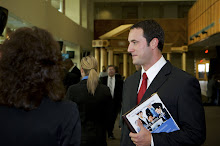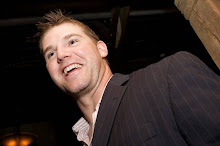
Why the NFL Spies on Its Players
To Buff Image, League Broadens Discipline, Hires Ex-Cops; 'A White Man in Sunglasses'
By HANNAH KARP
The National Football League's unprecedented new effort to protect its image by cracking down on loutish behavior is making some of the league's 1,952 players a little nervous.
This sweeping new personal-conduct policy, which was announced before the 2007 season, allows the NFL to quickly and summarily fine and suspend players; not just for committing crimes, but for any act that's deemed harmful to the NFL's "integrity and reputation." To guard against these unpredictable suspensions (there have been 10 so far), NFL teams are hiring former police officers and FBI agents as security chiefs, ordering up extensive background checks, installing video-surveillance systems in locker rooms, chasing down rumors and sometimes forbidding players from talking to the press.
During a recent road trip, the San Diego Chargers not only conducted bed checks, but placed guards in the hotel hallways to make sure players didn't sneak out. The Seattle Seahawks have declared an entire downtown entertainment district off-limits, and the Denver Broncos have begun sending a former cop to local nightclubs on weekends to make sure the players behave.
The increased scrutiny has taken a toll on some players, including Broncos defensive tackle Marcus Thomas. Last year, after the policy was announced, Mr. Thomas had called his agent in a panic: He said he was convinced he was being followed by "a white man in sunglasses" who had been sent by the NFL. A league spokesman says NFL security did not follow Mr. Thomas.
Offensive lineman Langston Walker of the Buffalo Bills, who has an economics degree from the University of California at Berkeley, is no fan of the new code, which he considers too aggressive. When someone intentionally spilled a drink on him at a Los Angeles bar recently, Mr. Walker says he was worried about how the NFL's discipline czars might have reacted if things had escalated. "When you start not to trust your own organization or governing body, who can you trust?" he sayThe NFL's new standards move it ahead of other U.S. sports leagues, whose policies on player behavior outside of competition are not as explicit. These changes come at a time when NFL players continue to make headlines for off-field incidents. Last year, Atlanta Falcons quarterback Michael Vick pleaded guilty to charges of sponsoring a dogfighting operation. A study by the San Diego Union-Tribune found at least 57 NFL players have been arrested so far this year, and that about 10% of the league's players currently on rosters have been arrested during their playing careers. NFL spokesman Greg Aiello says the league doesn't track arrest records. He says the 10% figure is misleading because it includes instances where charges were dropped.
The crackdown comes at a financially sensitive time for the league: NFL commissioner Roger Goodell warned last month that NFL revenues -- which total about $7 billion -- were "under pressure" and that it was searching "aggressively" for new sources of income. The NFL says the policy hasSome recent suspensions to key players handed down by the league have put teams in a tough spot. The Dallas Cowboys suffered an embarrassing loss to the Arizona Cardinals last month after cornerback Adam "Pacman" Jones was suspended indefinitely. Mr. Jones, who has a history of encounters with the law, was punished even though the incident -- an alleged tussle with one of his bodyguards -- didn't result in an arrest or any charges. (Mr. Jones, through his attorney, declined to comment).
The Minnesota Vikings lost three of their first four games this season while left tackle Bryant McKinnie was serving a suspension for an altercation at a Miami nightclub in February. Mr. McKinnie told reporters the incident was "blown out of proportion" and that he was surprised by the suspension's length. Under previous NFL policies, Mr. McKinnie would more likely have been fined or sent to counseling.
Kansas City's star running back Larry Johnson was suspended for this week's game after being charged with simple assault for allegedly pushing the side of a woman's face at a club in February. Mr. Johnson has declined to comment on the case, which has yet to be tried.
Dave Abrams, a retired police officer, was appointed security chief by the Broncos last year after a player was killed in a shooting. Mr. Abrams's BlackBerry is loaded with each player's personal information and he has trained dozens of bartenders and bouncers to call him when players show up. Sometimes he comes to take note of the women they're with and how much they've had to drink. "It's always fun to watch their eyes light up the first time they see me in a bar or a nightclub on a Friday night," he says. "It just makes them realize that someone's paying attention."
This June, when Bills running back Marshawn Lynch was suspected of being involved in a hit-and-run accident in Buffalo, Chris Clark, the team's new security director, was texting him within six hours. Mr. Clark advised Mr. Lynch not to talk to police without an attorney. Mr. Lynch eventually pleaded guilty to a traffic violation, which is not a violation of the NFL's conduct policy. The following month, Mr. Goodell assured Mr. Lynch he wouldn't be suspended. "You can't make things go away, but you can make things go a little easier for them," says Mr. Clark.
The NFL first started addressing criminal activity a decade ago with fines and mandatory counseling. In 2000, two NFL players, Rae Carruth and Ray Lewis, were charged with murder. Mr. Carruth was convicted and Mr. Lewis was exonerated. After this, the league's pre-employment screening was expanded to identify "at risk" players and every team was instructed to hire a full-time security director. Not every team did. Before the Cincinnati Bengals hired one last year, the team famously saw nine of its players arrested in a nine-month span.
Since Mr. Goodell became commissioner in 2006, he has taken steps to promote a more wholesome image for the league. He's beefed up the NFL's program for rookies, adding sessions on media training and eight hours of "conduct-management" class. He added a stringent behavior code for fans and issued a rule forbidding cheerleaders from warming up in close proximity to visiting teams. At his annual address to reporters at the 2007 Super Bowl, Mr. Goodell said he felt the number of incidents had reached "a few too many." Mr. Aiello says the policy aims to "protect the integrity of the game" and that Mr. Goodell is always looking for ways to improve the league's operations "and to aggressively enforce our rules."
The NFL players union says the personal-conduct suspensions and fines have been excessive, "particularly in cases where a player has been accused of but not found guilty of a violation of law," says spokesman Carl Francis.
In a few cases, judgments have been amended. Last month, Cleveland Browns tight end Kellen Winslow Jr. saw another side of the policy. After developing a staph infection (the bug had been plaguing the team for some time) he received text messages from a press official who challenged the hospital's diagnosis, warned it would be "very bad" to talk about the situation to reporters, and suggested he invent another illness. "We can give [the media] something, but not staph," said one.
When he refused, the team suspended him for detrimental conduct, citing the NFL's new policy. After Mr. Winslow showed higher-up executives the messages, the suspension was rescinded. "I think the player-conduct policy can be very subjective at times and might need some restructuring to clearly define what is and is not considered conduct detrimental, so it is not improperly imposed," Mr. Winslow says. A Browns team spokesman says "the matter was resolved several weeks ago and we've moved on."
In any event, the days of teams taking a passive view of player discipline seem to be over.
Last season, shortly after several San Diego players were cited for sneaking out of a team hotel, the team fired security director Mike Cash without explanation, according to Mr. Cash.
Mr. Cash says he never expected his job to involve babysitting. "They're grown men," he says. "They're going to do what they want." The Chargers declined to comment.
Write to Hannah Karp at hannah.karp@dowjones.com
Corrections and Amplifications:
The National Football League keeps track of individual player arrests but doesn't compile the overall percentage of its players who have been arrested during their playing careers. This article incorrectly said the NFL doesn't track arrest records.




3 comments:
It appears that there may be a section missing in your posting. Specifically between the paragraph that started "Chris Clark of the Buffalo Bills" and the following one, "When he refused, the team suspended him". Interesting article. Thanks.
Jakers- thanks! updates have been made.
This is unfortunately very necessary. I have worked with professional athletes up close as personal members of their private teams. Even the well known and respected "good guys" have their issues. Professional athletes often feel that their priveledge of influence extends beyond the law and responsibilities of civility in our society. Bravo for the NFL to realize that they need to check their players, although disparaging that they had to be hit in the pockets to act on this problem.
Post a Comment